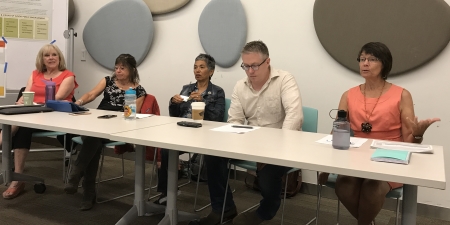The Public Participation Working Group was commissioned by the Boulder City Council in 2016 as a result of concerns by members of the public that public processes that led up to many important city actions had just served as facades to legitimate pre-ordained outcomes, had excluded certain interested parties, had been incomplete or truncated, or had suffered from other major defects. The working group consisted of fourteen citizen members, along with two City Council members, as well as facilitators and supporting staff. It met over 33 times. Public processes surrounding the affordable housing linkage fees, the Housing Boulder strategy, the North Trail Study Area, the “co-op” ordinance revision, and the “right-sizing” of Folsom Street were widely considered to be deficient and were examined by the working group. It issued its final report this June.
On Friday, September 22, PLAN-Boulder County held a forum to explain the work of the working group. A panel included four members of the group: City Council members Lisa Morzel and Mary Young, Deanne Butterfield—a former City Council member and professional facilitator, and Bill Shrum—a former University Hill businessman, current staff member of The Elephant Journal, and CU graduate student in communications.
The panel’s discussion was moderated by former Boulder City Council member Crystal Gray, who also organized the forum.
Butterfield recounted that the group decided to embrace five core principles of good public engagement:
- Define the problem or issue clearly before you start
- Thoughtfully plan the public engagement
- Encourage and include all voices
- Participants should be civil
- The process should be trustworthy and transparent
The group found that the city’s public processes often failed to follow one or more of these principles. It ended up issuing two recommendations:
- Change the culture in Boulder
- Implement a more disciplined and systematic approach to public process
Shrum remarked that culture is the sum of all the things around us that lead us to behave in certain ways. He said that part of the culture in Boulder is that people have high expectations about public participation and do not feel that they should be limited in expressing their opinions on a subject to two minutes in front of the City Council. He also noted that most city problems are “wicked problems,” by which he meant long-term, inter-related with other problems, and susceptible to no single solution. The public and Council often have difficulty recognizing all the aspects of a “wicked problem,” he said.
To help change the culture, the working group’s final report called for the development of guidelines for “civil and constructive conduct in meetings, dialogue and decision-making processes.”
Butterfield asserted that one of the conclusions of the working group was that the city and the public should “be bold” by engaging in “the big questions.” “We are terrified to have a big-picture discussion among ourselves,” she remarked. But Morzel subsequently contended that the public is “very divided” about the “big picture”—what Boulder will look like in the next generation or two with respect to population size, employment numbers, density, development, public spaces, etc. Consequently, she implied, there has been a tacit agreement to avoid the subject.
Both Morzel and Young expressed strong support for “sub-community” and/or “neighborhood” plans as opportunities for constructive public processes that can build trust among community members and reconcile conflicting interests. Morzel extolled the North Boulder Sub-Community Plan, in which she prominently participated as a citizen in the 1990’s, as an effective way to create consensus. She said that she did not understand why some members of the City Council and the city staff were so opposed to this level of planning. Young said that neighborhood critics viewed neighborhood plans as obstacles to change. But she indicated that neighborhood plans could empower residents and local businesses in a positive manner to help determine their own futures.
Former Boulder Mayor Susan Osborne, a member of the forum audience, said that although she generally agreed with the contents of the working group’s final report, she was disappointed that it lacked a proposal to implement its recommendations. Osborne asked if the City Council every year at its annual retreat in January would designate which major city projects would involve thorough, public processes. Morzel and Young said that they hoped that the next city budget will include funds to hire two new city staff members to devise an implementation plan.



